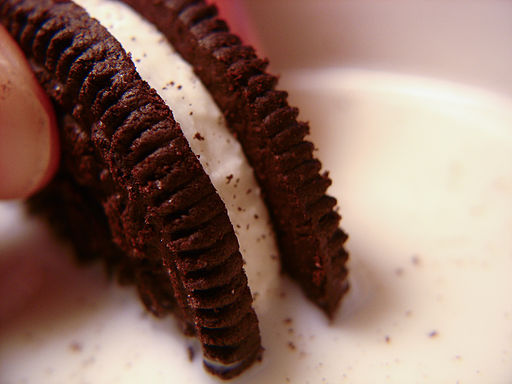 More and more, I’m coming to understand that addiction has little to do with substances and everything to do with the person. The question is not why people become addicted. People become addicted because they are in pain. The question then becomes, what is the source of the pain and how do we help people heal.
More and more, I’m coming to understand that addiction has little to do with substances and everything to do with the person. The question is not why people become addicted. People become addicted because they are in pain. The question then becomes, what is the source of the pain and how do we help people heal.
A recent news report says that Oreo cookies are as addictive as cocaine. A separate story on that research countered with the argument, “Drugs Are No More Addictive than Oreos”. Now I think it’s a little ridiculous to compare Oreo cookies to cocaine. I’ve seen what cocaine does to an addicted person and I’ve NEVER seen anything similar from someone eating Oreos.
Of course, I always question research done on rats because rats are not people. We have much more advanced brains (some of us anyway) so it’s hard to generalize the research to humans. I’m also reminded of the Rat Park research that showed even rats are somewhat immune to addiction when placed in a suitable environment.
But the research does show that high-fat/high-sugar foods stimulate the brain in ways similar to other addictive substances. As the article states, “most drugs are thought to work by hijacking the brain’s pleasure center”. It appears that cocaine, food, gambling, sex and any number of other activities have the potential to make addicts of us all.
So why aren’t we all addicted to something? If these substances and behaviors are inherently addictive, why aren’t we all affected? There are those who argue we are. Our eating habits, television watching, smart phone using, and compulsive shopping are all potential problems. But is it the same? Are these common activities really as dangerous or harmful as cocaine?
They may not be as dangerous or harmful but it seems they can be as addictive; especially when a person is susceptible to addiction. And what makes people susceptible to addiction? The short answer is pain. Be it pain from loss, from neglect, from trauma, from loneliness or from dozens of other sources.
People can also become addicted as a result of physical pain; however that potential appears to be exponentially increased in the presence of emotional or psychological pain. Many of us have taken prescription pain medication as prescribed in our lives and yet we discontinued that use when the pain went away or the prescription ran out. Apparently, most of us are able to balance potentially addictive behavior without major problems.
I recently added a book to my reading list (it’s getting pretty long) called Start with Why: How Great Leaders Inspire Everyone to Take Action. The author describes the traditional approach to business starting with what we do, then defining how we’re going to do it and finally (if at all) asking why. He argues that great leaders start with why, then ask how and finally define what they are going to do. The book has nothing to do with addiction but I think the same principles apply.
When treating addicted persons, we should start with why. Why are they addicted? Why are we trying to help them? Why does it matter? We should carefully answer each question and do our best to answer them accurately. We can then decide how to best help them and specifically what we’re going to do about it.
So why are people addicted? I believe it is because they are in pain. Why are we trying to help them? I believe they deserve better. Why does it matter? Because we are all more connected than we realize. If we start with why, we might better be able to find the most effective how and what.



10 thoughts on “Addiction is Not About Drugs”
What an interesting take on addiction. It’s refreshing to hear the “Why?” question in this age of The Rule of Evidence-Based Treatment that doesn’t seem to want to bother with that. Thank you for this post.
Thanks Tina. I worry about the push towards evidence based treatment, not because I don’t think it works, but because I think it neglect the role of and required skill of the counselor in assessment and treatment. It gives the false impression that anyone can follow a script and resolve some of these problems that require a deeper understanding. Evidence based practices can work, but only in the hands of a skilled and understanding therapist.
I’m comfortable with the ambiguity of it all. It use to make me crazy because people think they know the answer; especially people that don’t have an addiction. Addiction is genetically passed along, like diabetes and other diseases, The genetics place people at risk for developing addictions. I like to think of it as a hard wiring problem. Add behaviors that change the pathways in the brain, and presto, you have addiction. I hate that we use the work addiction so cavalierly because it lessons the severity of a chronic, progressive, life threatening disease. I hate when I hear on the news, that we are addicted to foreign oil. Also, I love my coffee, but I’m not addicted to that either. Drinking coffee does not destroy your life or the life of others. I don’t need twelve pots of coffee now to get the same affect as the one pot I use to drink. We do things because there is a payoff, it makes us feel good or whatever. If you would like to stop using are doing something, but it only progresses and it is destroying your life, then we can talk addiction.
As a counsellor in an Addiction service I am always curious about “why” people use substances to deal with life’s difficulties. Psychological pain or what I refer to as soul pain always underpinns the behaviour and the most common is unresolved childhood sexualised abuse. One client aged fifty told me “I use alcohol to get away from the feelings, I become like the eight year old – dumbfounded and frightened. Giving up alcohol adds to my fear as it is the only way I can stop myself from killing myself.”
Thanks for that insight Geraldine. That reminds me of a recovering addict I heard once say that alcohol and drugs kept him alive until he could figure out how to live without them. I didn’t completely understand that statement at the time but I eventually have.
I used to believe entirely in the genetic explanation of addiction but have come to realize the importance of experience in the process. There is too strong a link between adverse childhood experiences and adult health to ignore. The book by Dr. Gabor Mate called In the Realm of Hungry Ghosts, along with the information from the ACE Study, have caused me to reconsider a strictly genetic view of addiction.
@ Daniel Morris…” When treating addicted persons, we should start with why.” BRAVO, SIR!!!
Furthermore…” The question then becomes, what is the source of the pain and how do we help people heal.” PERFECT!!! Searching for the “root” of the pain, instead of treating the symptoms alone with medication.
Excellent article, I work in London helping people with serious mental illness quit smoking and have realised the biggest reason people smoke is due to stress, this could be emotional stress from past and present incidents or environmental stress. I therefore spend a large part of my sessions helping people cope with stress differently rather than using what I term non cost neutral coping strategies such as cigarettes, alcohol or cannabis.
I’ve noticed almost all of my clients with PTSD smoke cigarettes and seem to have much more difficulty quitting than clients without any significant history of trauma. While we try to treat tobacco use as any other substance of abuse, the attitudes and cultures in the central US aren’t quite on board with that yet.
I think that you are absolutely correct about why! I often wondered why the addicted person doesn’t ask themselves that same question. When treating addicted persons, we should start with why. Why are they addicted? Why are we trying to help them? Why does it matter? We should carefully answer each question and do our best to answer them accurately. We can then decide how to best help them and specifically what we’re going to do about it. This is a real eye opener!
Comments are closed.